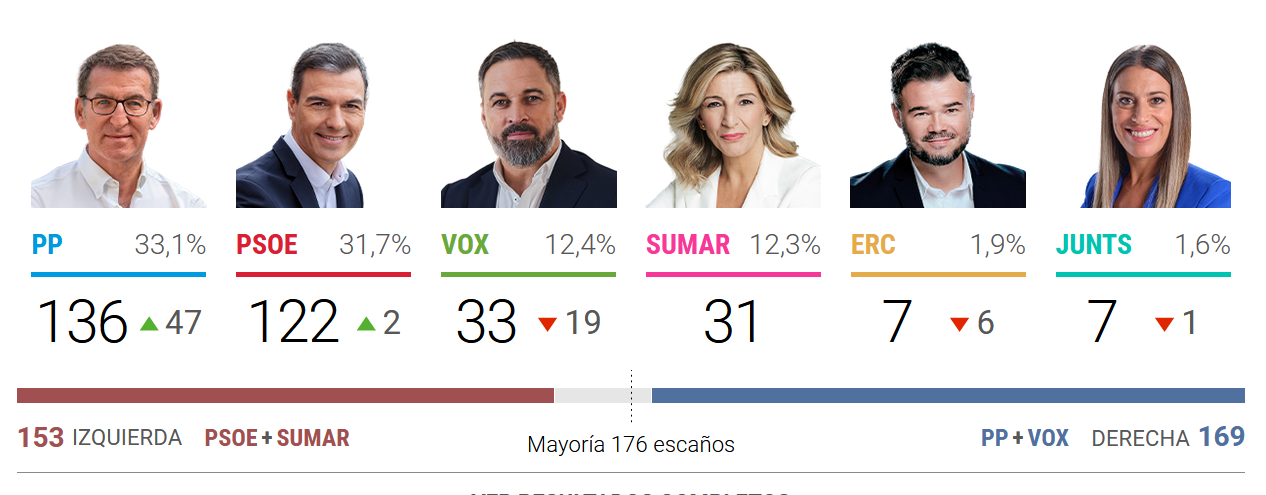Just over 1% of the votes separates the People’s Party and Prime Minister Sánchez’s Social Democrats. Catalan and Basque nationalists will have the key of the government.
![The candidate of the PP and winner of the election, Alberto Núñez Feijoo, votes in his hometown in Galicia, on 23 July 2023. / Photo: [link]Twitter A Núñez Feijóo[/link].](https://cms.evangelicalfocus.com/upload/imagenes/64be37181ebf8_feijoo940Cropped.jpg) The candidate of the PP and winner of the election, Alberto Núñez Feijoo, votes in his hometown in Galicia, on 23 July 2023. / Photo: [link]Twitter A Núñez Feijóo[/link].
The candidate of the PP and winner of the election, Alberto Núñez Feijoo, votes in his hometown in Galicia, on 23 July 2023. / Photo: [link]Twitter A Núñez Feijóo[/link].
Amid soaring temperatures, Spain voted on Sunday for a new national parliament, proving that the country is diverse and difficult to govern.
Despites surveys anticipating for weeks a clear victory of the People’s Party (PP, conservatives), the Prime Minister Pedro Sánchez (PSOE, social democrats) received enough support to try to form a new government with the support of small leftist parties and pro-independence groups from Catalonia and the Basque Country.
The slim distance in votes between the largest parties (33% against 31,7%) translated into 136 seats for PP’s candidate Feijóo and 124 for PSOE’s Sánchez. Both are far away from the majority of 176.
Despite the temperatures of around 35 Cº in most of the country and many citizens enjoying their holidays, 70.4% of the population exercised their right to vote.

[photo_footer] The 23 July national parliament election results in Spain. / Graph: RTVE public televison. [/photo_footer] On election night, Feijóo defended his right to try form a government. But the only possible partner, hard right party Vox, would not be enough to form a right-wing majority. Vox won 33 seats (19 less than in 2019).
Getting the support of the leftist group Sumar (31 seats) and the representation of as many as four pro-independence parties in Catalonia and the Basque Country (which together have 25 seats) would be the only option for Pedro Sánchez to continue in power four more years.
Analysts point to a “blockage” in which neither the left nor the right is able to form a government, which could end up leading to a repetition of the election in January 2024.
In the two weeks before the election, the candidates accused each other of lying and presented very different images of the state of Spain.
Some of the main political disputes were around the presence of LGBT flags in institutional buildings (after the regional elections victory of the right in May, some conservative town halls opted to only allow constitutional flags), the future of pensions, and how far the laws regarding climate change and environmental sustainability should go.
During the campaign, the role of religion and faith minorities was not a talking point for the main political parties. Their electoral programmes spoke of a general commitment to religious freedom and a dialogue with faith minorities.
In interviews with Christian media, nevertheless, representatives of the three largest parties in Spain praised the social work of evangelicals with migrants and their coherence in defending their Christian values.
Ahead of the vote, the Spanish Evangelical Alliance issued a 70-page document titled "Vote with an informed opinion", in which experts addressed central issues in society from a Christian perspective.
Evangelical Christians in Spain represent between 1% and 2% of the population.
[donate]

Las opiniones vertidas por nuestros colaboradores se realizan a nivel personal, pudiendo coincidir o no con la postura de la dirección de Protestante Digital.
Si quieres comentar o